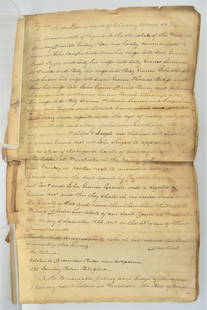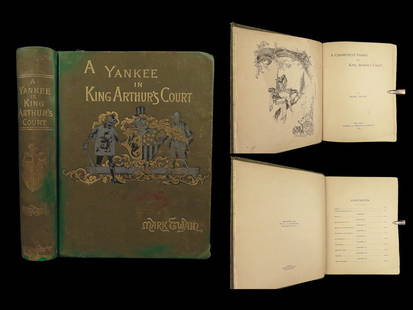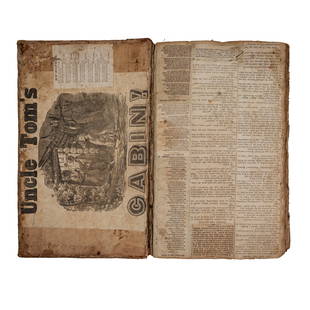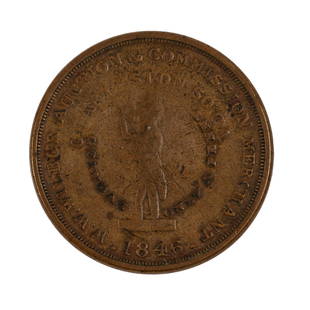
Manuscript document on early court case of slave law
Similar Sale History
View More Items in Books, Magazines & Papers
Related Books, Magazines & Papers
More Items in Books, Magazines & Papers
View MoreRecommended Collectibles
View More




Item Details
Description
Author: Grundy, Felix and James Rucks
Title: Original manuscript statement of legal argument on the issue of Negro slave identity
Place Published: Nashville, Tennessee
Publisher:
Date Published: ca. 1824-1825
Description:
Autograph Manuscript. 3 pp. + docketing note which appears to be an invoice for miscellaneous legal costs.
Signed as "Grundy and Rucks, attorneys", who represented the defense. The case involved "Phebe, a woman of color" suing Abram Vaughan for her freedom. It was the first significant American court case on the issue of Negro slave identity. Scarce document that notes future Attorney General Felix Grundy's involvement in early case of slave law.
Grundy later served as Attorney General in President Van Buren's Cabinet during the Amistad slave revolt case, when he opposed the eventual ruling of the US Supreme Court, setting those slaves free. The case is not even mentioned in the 2010 biography of Grundy, which admits that his general devotion to the institution of slavery was one of his failings as "Democracy's Lawyer".
The Phebe case is cited in many legal histories of slave law in the antebellum South, and discussed in detail in Professor Ariela Gross's 1998 monograph in the Yale Law Journal, "Litigating Whiteness". Gross adds an account of Vaughan, a slave owner who had once remarked (in a drunken stupor) that all Blacks should be freed; but, in this case, had been so outraged by the lawsuit of Phebe and her two sons, whom he had brought to Tennessee from Virginia, that he had nearly killed one of the boys by a brutal whipping. He had then engaged Grundy, a well-known court advocate and former US Congressman, to defend the case. Phebe argued that she was being wrongly held in slavery because she was descended from an American Indian woman, her grandmother, who was not a slave. For proof, she had witnesses who testified that they knew her grandmother, who was known to be "of Indian extraction" and a free woman. Since in Tennessee and most Southern states, "racial identity" was determined through the maternal line, Phebe argued that she too should be considered free. Mundy and Rucks countered - as they stated in this document - that this was merely "illegal" hearsay evidence which should not be credited as proof of Phebe's "pedigree", that "you cannot prove by hearsay whether an ancestor was European or Indian, white or black, Slave or free". Several Courts, with reservations, disagreed and eventually awarded Phebe her freedom.
Condition
Buyer's Premium
- 30%
Manuscript document on early court case of slave law
Shipping & Pickup Options
Item located in Berkeley, CA, usPayment





































![[PIRACY]. A group of 4 manuscript court documents pertainin...: [PIRACY]. A group of 4 manuscript court documents pertaining to restitution and recovery of the American Brig Eliza, captured by Spanish privateers. [Washington, D.C., November 1801 - ca. April 1802].](https://p1.liveauctioneers.com/928/301544/160920933_1_x.jpg?height=310&quality=70&version=1694462960)











































![George Washington Signed Discharge: Partly printed discharge document signed by George Washington, as Commander in Chief of the Armies of the United States. Newburgh, [New York], 4 January 1783. 1 page, ## x ## in. Undersigned by Washin](https://p1.liveauctioneers.com/7226/322253/173251475_1_x.jpg?height=310&quality=70&version=1710004847)

